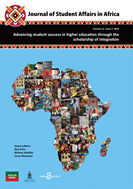Constitution and negotiation of rural students' identities at an urban South African university
DOI:
https://doi.org/10.24085/jsaa.v12i2.4739Keywords:
Rural Students, Constitution of Identity, Negotiation of Identity, Urban University, Rural AreasAbstract
Utilizing a social constructivist lens, this study explores how students from rural areas constitute and negotiate their identities within an urban South African University. Much of the research on rurality in South Africa has focused on rural areas as places, and not on the people occupying them. This qualitative study employed a narrative inquiry using the Life Course Theory of Development as its theoretical framework. Data collection comprised a mix of semi-structured questionnaires and focus group interviews. Data was analyzed using content analysis. The findings were threefold: first, in constituting their identities rural students remained grounded in who they were, contrary to literature which found rural students trying to fit into the dominant hegemonic culture of an urban university. The study found that students remain grounded in their rural identities. Second, in negotiating their identities, rural students assumed hyphenated identities-the rural-urban binary-to blend into the urban environment, assuming a 'chameleon identity' but did not abandon their social-cultural upbringing, philosophy, values, and attributes when they joined an urban institution. They aligned with philosophies that resonated with their upbringing rather than seeking to be assimilated. Third, when they joined an urban university they began to perceive their role as having shifted from being recipients of their background to becoming contributors to its development
Downloads
Published
Issue
Section
License
Copyright (c) 2024 Dr Kolisa Siqoko; Prof. Saloshna Vandeyar (Author)

This work is licensed under a Creative Commons Attribution-NonCommercial-ShareAlike 4.0 International License.
Authors who publish with this journal agree to the following terms:
Authors retain copyright and grant the journal right of first publication with the work simultaneously licensed under the Creative Commons Attribution Share-alike 4.0 International License that allows others to share the work with an acknowledgement of the work's authorship and initial publication in this journal.
Authors are able to enter into separate, additional contractual arrangements for the non-exclusive distribution of the journal's published version of the work (e.g., post it to an institutional repository or publish it in a book), with an acknowledgement of its initial publication in this journal.
Authors are permitted and encouraged to post their work online (e.g., in institutional repositories or on their website) prior to and during the submission process, as it can lead to productive exchanges, as well as earlier and greater citation of published work (See: The Effect of Open Access).


